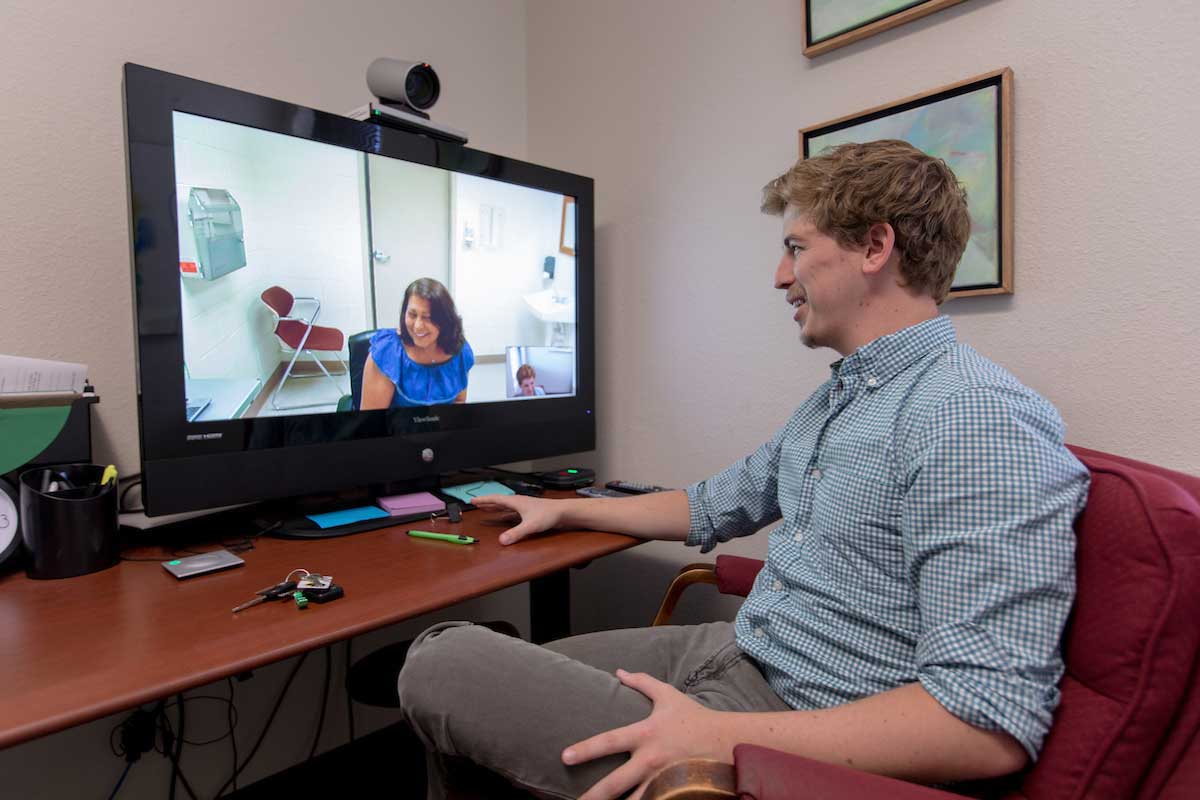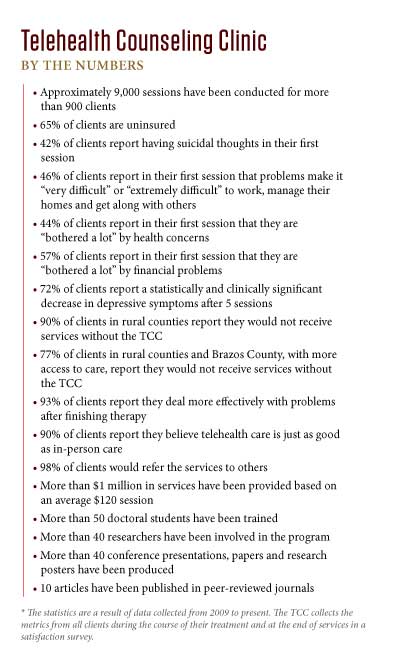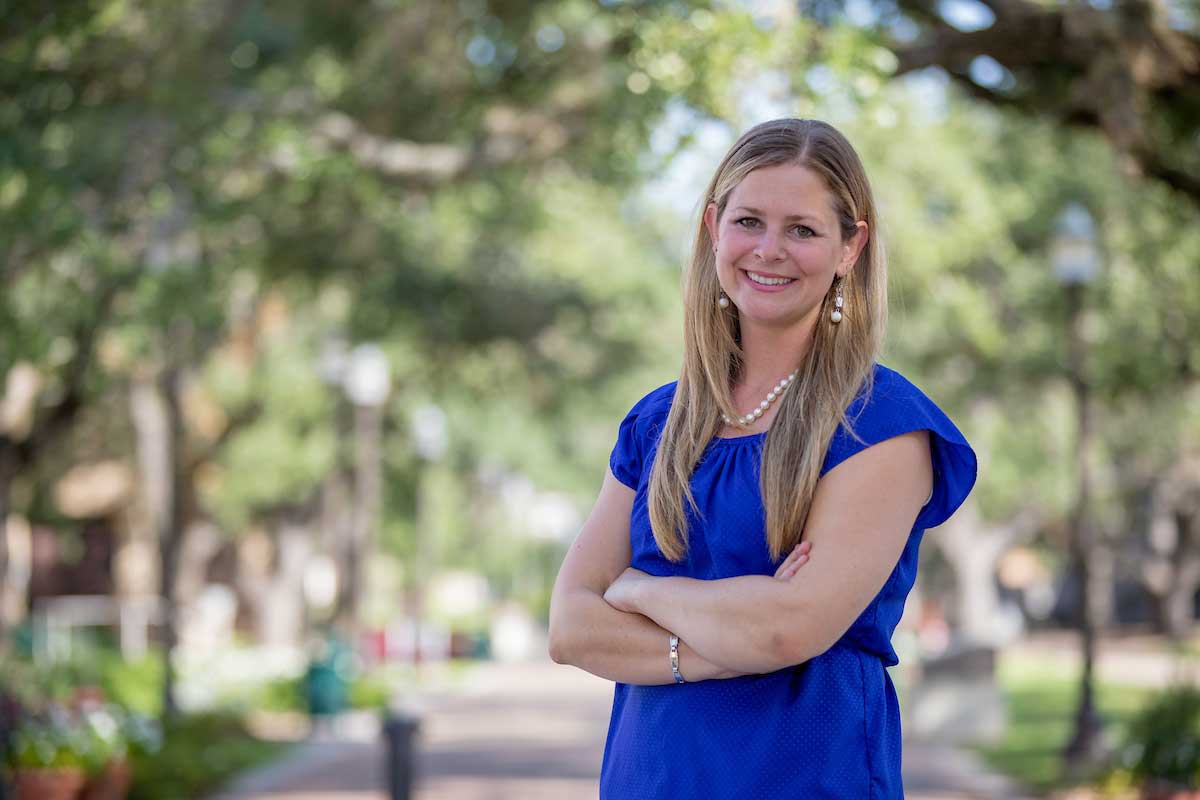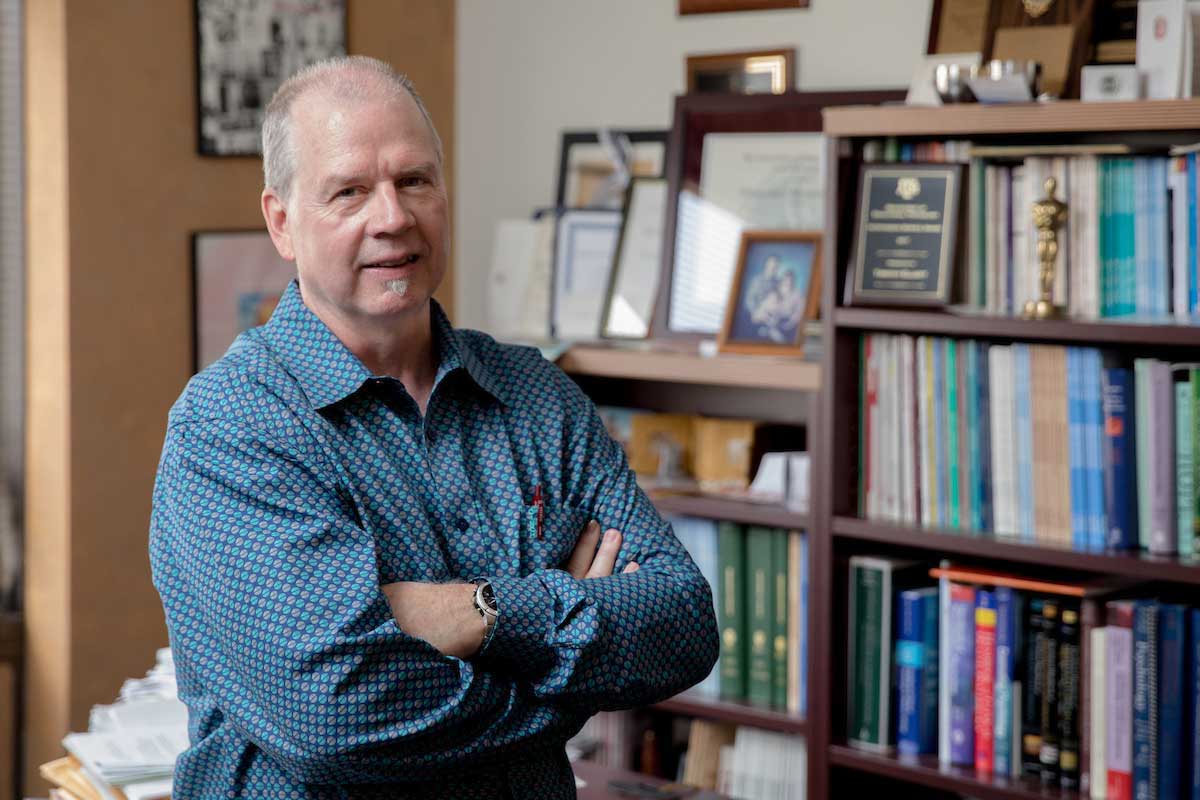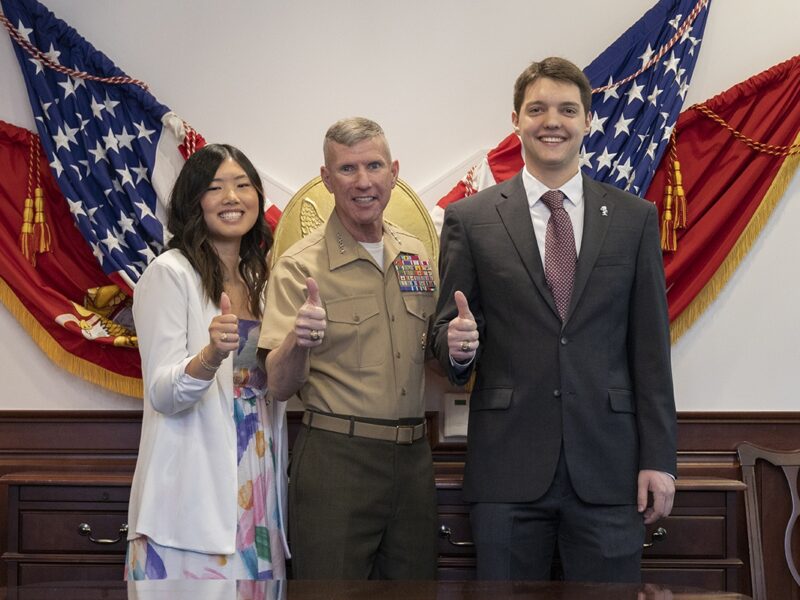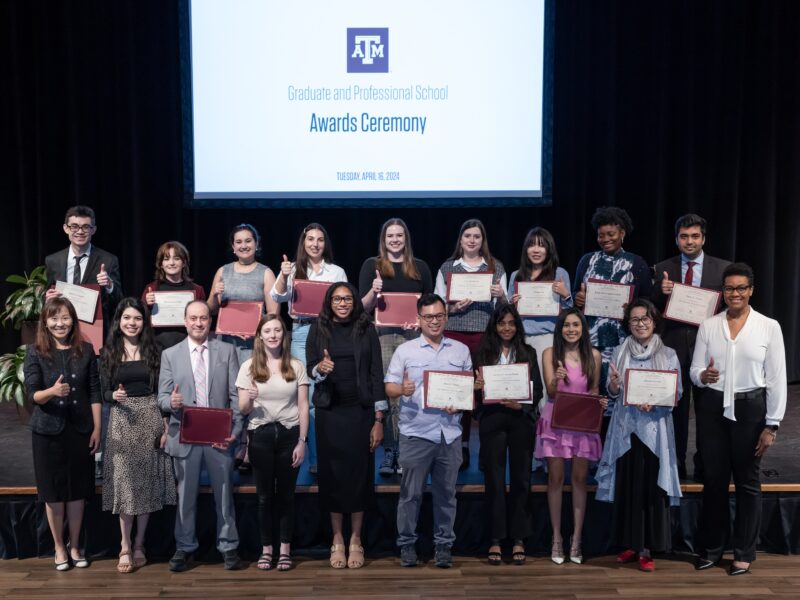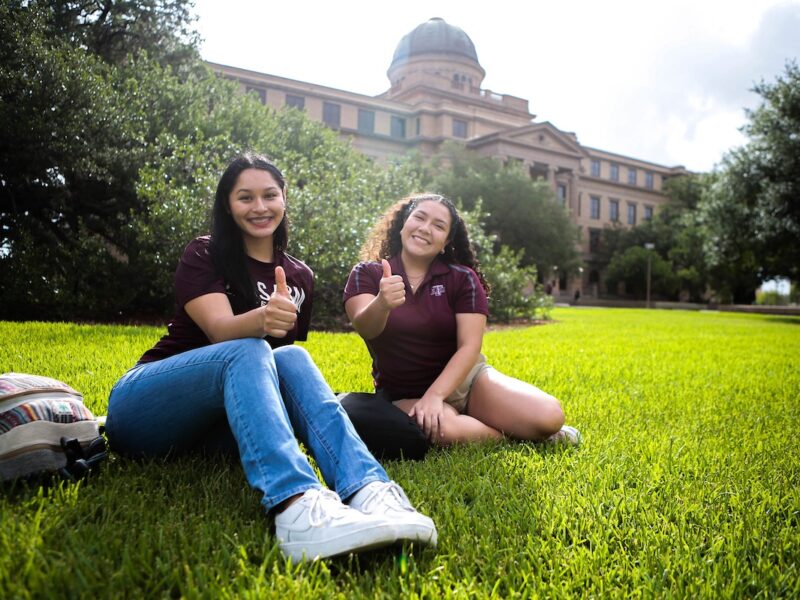Texas A&M Mending Mental Health Care With Telehealth Counseling Clinic
When it comes to providing mental health care to its residents, Texas is second to last* among ranked U.S. states and territories in mental health spending per capita, according to the Henry J. Kaiser Family Foundation. Surpassed only by California, Texas also has the most Mental Health Care Professional Shortage Areas.
These shortage areas are home to almost 10 million residents, which means Texas, based on the size of its underserved population, has a greater need than any other state. Contributing to this dilemma is the fact that more than two-thirds of licensed clinical psychologists practice in the five most populous counties in the state, leaving the remaining 249 counties with inadequate care. Many counties are without a single licensed clinical psychologist.
Professors and doctoral students at Texas A&M University are helping to narrow the gap between mental health care needs and access to treatment, particularly in rural areas where the shortages are greatest, with the Telehealth Counseling Clinic (TCC).
Located on the campus of Texas A&M in College Station, the clinic is pioneering a program that trains doctoral students in telepsychology and provides research opportunities for faculty and students while delivering therapy to underserved communities. The doctoral students counsel clients at satellite clinics in surrounding areas using interactive videoconferencing technology.
“Our program is likely the only one of its kind, and serves as a model for other universities and communities,” said Dr. Carly E. McCord, director of clinical services at the TCC and assistant professor in the School of Public Health. “As our clinic approaches 10 years in operation, we have become the experts in this relatively new concept in mental health care, and we get inquiries from psychologists around the world, some wanting to set up telehealth networks in places where psychology degrees aren’t offered, credentialing processes don’t exist and there are no ethical standards.”
TCC, Brazos Valley pioneer mutually beneficial mental health care model
Every few years, the Center for Community Health Development in the Texas A&M School of Public Health conducts a needs assessment for the Brazos Valley that consistently confirms mental health care as one of the greatest deficiencies in the seven-county area.
In 2009, University Distinguished Professor of Counseling Psychology Timothy Elliott and Professor of Health Promotion and Community Health Sciences Jim Burdine, both at Texas A&M, established a satellite counseling clinic, their first, in Leon County, where they recognized the most significant need. McCord, while still a doctoral student, helped to launch the original clinic.
“This provided me with experience I don’t think any other students were getting at the time and laid a foundation for my entire career,” McCord said.
The TCC is an example of a successful, mutually beneficial town-and-gown partnership between concerned citizens and university faculty that other communities and educational psychology programs can emulate, Elliott said. This is especially important as mental health care provider shortages and budget constraints increasingly stress many communities.
“Our program demonstrates how science and training can inform policy decisions pertaining to mental health care and potentially apply to other challenges facing communities,” Elliott said. “Our TCC, recognized as one of the nation’s leading telepsychology training programs, is a cost-efficient and effective model that uses scientific tools to get the information we need to make reasonable, knowledgeable decisions that are in the best interest of our communities and citizens.”
The clinic helps to inform decisions about the quality of telepsychology by providing data on responses to treatment, long-term outcomes and supervisory practices. In the past, professional leaders and policymakers often have debated such issues without the benefit of data.
A powerful case for telepsychology in rural areas
Leon County, like most rural counties, has many barriers to mental health care, including few providers and far distances to the nearest providers, and many residents without transportation and health insurance or other means to finance care.
“When you think about Leon County, it’s a 3-hour round-trip commute to College Station plus the 45-minute counseling session,” McCord said. “Who can afford to take off half a day of work once a week to see a counselor?”
Working with community stakeholders, the TCC faculty leaders have since opened satellite clinics in four other Brazos Valley counties, including Madison, Washington, Grimes and Brazos, and they intend to open clinics in the remaining two, Burleson and Robertson. Each county donates space for its clinic and provides one full-time employee who helps facilitate the counseling sessions.
Primary care providers, local mental health authorities and psychiatrists often refer clients to the TCC. Other individuals learn about the clinic by word of mouth and contact the staff directly to schedule appointments.
“We are providing mental health counseling for hundreds of individuals who would otherwise go without the benefits of care,” McCord said. “Over the last decade, through counseling, our clients have mended broken relationships, raised self-esteem, avoided unnecessary emergency room visits, stayed out of prisons, and found housing and employment when they had none.”
More than 90 percent of the clients who reside in the rural counties report that they would not receive counseling without the TCC. Including Brazos County, which enjoys more access to care, more than three-quarters of them still say that they would not receive care without telehealth services.
Majority of clients report improved quality of life after TCC treatment
Since 2009, the clinic has provided 900 clients with approximately 9,000 free counseling sessions, a monetary value of more than $1 million in services based on an average cost of $120 per session. Clients are required to be age 13 or older, and each participates in an average of nine 45-minute sessions, available in English, Spanish or Mandarin.
Approximately 65 percent of the clients are uninsured, which makes delivering the services free of charge essential to the clinic. Many of them use emergency rooms as their primary care settings for both physical and mental health problems, including attempted suicides and the intense physiological symptoms that accompany panic and anxiety attacks.
During their first sessions, 42 percent of clients report having suicidal thoughts, and nearly half of them say their mental health problems make working, managing their homes and getting along with others difficult. Often, they also are dealing with physical health problems, and most are experiencing financial difficulties.
By alleviating depression and establishing safety plans for clients, the clinic is improving and even saving lives. From a practical standpoint, the clinic also helps to avoid the expenses associated with some emergency room visits as well as inpatient hospital stays that cost an average of $23,000, McCord said.
Group therapy, the latest addition to the clinic’s offerings, connects multiple residents from different counties for sessions through telehealth technology. This type of therapy has proven particularly valuable in rural areas where finding five individuals with the same issue who are available to meet at the same time is often challenging. Generally, group therapy provides clients with the benefits of the shared experience, a complement to individual counseling.
After five counseling sessions, the majority of the clients show significant clinical and statistical decreases in depressive symptoms, and almost all of them report dealing more effectively with their problems.
Eventually, the clinic aims to offer in-home videoconferencing, especially in rural areas without public transportation systems. This offering is not expected to change the role satellite clinics play in serving clients.
“There is still a digital divide for rural areas with poor Internet connectivity, and clients may not have computers or smartphones, or their phone data plans may not support home video sessions,” McCord said. “From a clinical perspective, getting severely depressed clients out of their houses for appointments at satellite clinics is often a valuable part of their treatment plans.”
While videoconferencing is the clinic’s main mode of conducting counseling, telephone sessions also are available to clients in their homes and workplaces. Some clients take advantage of phone sessions from their cars during their lunch breaks at work.
TCC aims to improve, increase telehealth training nationally, globally
Since 2009, the TCC has trained more than 50 doctoral students in telepsychology and involved more than 40 researchers in its program.
In addition to counseling and research, the students perform their fair share of social work. On behalf of their clients, they communicate with mental health authority caseworkers, welfare offices, food banks and physicians, when necessary.
Many students choose to pursue careers in telepsychology so they can use their knowledge and experience to make a difference in provider shortage areas, sometimes their hometowns, across the nation and around the world, McCord said.
“It’s awesome serving the surrounding community, but the change agents we are creating, the leaders at the cutting edge of what we are doing in health care, sending out Aggies to go change the world, literally, now that’s something to invest in,” McCord said.
A gap exists between the telepsychology wants and needs of consumers and communities, and the telepsychology training provided students entering the workforce, as well as professionals already in practice.
“This is why I am so passionate about helping other programs add telehealth training to their clinics,” McCord said.
The faculty and students have produced over 40 conference presentations, papers and research posters, and composed 10 articles published in peer-reviewed journals.
Five continuing education units, including telehealth 101, laws and ethics of telehealth, and managing crises and emergencies in telehealth, are available online. The online training helps fulfill the clinic’s mission to extend mental health care to areas without adequate resources, and nominal fees for the courses help sustain the program.
Additionally, training provided by TCC faculty provides financial support. For example, the U.S. Department of Defense recently hired McCord and her colleague to train Army and Air Force mental health practitioners on a United States Air Force base located in Italy.
McCord and her colleagues are in the process of developing a comprehensive sustainability model for the program to cover operating expenses in the absence of grants that soon end. Most grants, such as those secured to launch the clinic, do not provide funding to sustain existing programs.
“Our students are learning creative ways to find funding outside traditional channels,” McCord said. “With a lot of hustle, anyone can provide these services to the underserved.”
For more information, visit the TCC website*.
###
Media contacts: Ashley Green at 979-458-1334 or a_green@tamu.edu; or Elena Watts at 979-458-8412 or elenaw@tamu.edu.
* This link is no longer active and has been removed.
